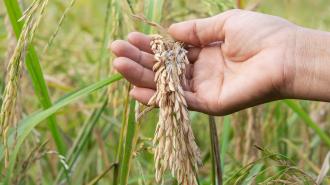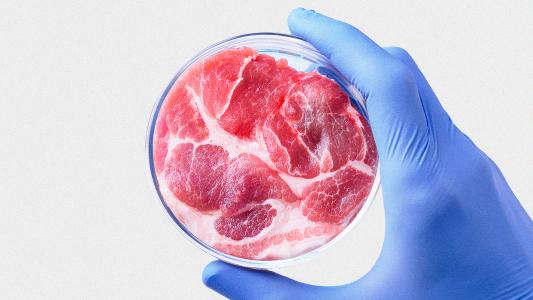Thanks to CRISPR, farmers may finally have a good defense against rice blast, a fungal disease so devastating, it’s known as the “cancer of rice.”
The challenge: Rice provides more than 20% of the world’s calories, but every year, rice blast wipes out 10-30% of the world’s rice crops, making it a major threat to both global food security and economies that depend on rice production.
“Blast is the most serious disease of plants in the world because it affects virtually all growing regions of rice and also because rice is a huge crop,” said Pamela Ronald, a distinguished professor in the Department of Plant Pathology at UC Davis.
“The results from this study could help shore up food supply in the future.”
Jenny Mortimer
What’s new? Ronald and an international team of researchers have now found a way to use CRISPR to make plants resistant to rice blast. In small field trials, their gene-edited rice plants yielded five times as much rice as controls when challenged with the fungus that causes blast.
“Rice crops with higher yields are needed to meet growing global demand, and the results from this study could help shore up food supply in the future,” said study co-author Jenny Mortimer from the University of Adelaide.
The idea: During a rice blast infection, lesions — spots of dead cells — form on the parts of the plant above the ground. Unless a farmer treats the infection early with expensive fungicides, these lesions spread and merge until the entire plant is dead.
Just like we have an immune system to protect us from diseases, rice plants have one, too, but while a rice blast infection can trigger an immune response, the plant’s natural defenses are usually overwhelmed by the fungus.
Enter: “lesion mimic mutants.”
Genetic sequencing led to the discovery of a mutant that conferred protection against infections.
These genetic mutations cause plants to display the same patches of dead cells present during an infection, despite the plant being infection-free. As a result, their immune systems swing into action, killing the cells around the lesions to prevent the “infection” from spreading.
While working in Ronald’s lab, study co-lead author Guotian Li — now at Huazhong Agricultural University — sequenced more than 3,200 rice plant strains, leading to the discovery of a mutant that conferred protection against bacterial infections.
Plants with the natural mutation were small and didn’t yield much rice, but the researchers were able to identify the mutant gene, which they call RBL1 (resistance to blast1).
Using CRISPR and other techniques, they’ve now created a line of rice plants with a version of the RBL1 mutation that makes them resistant to three bacterial and fungal infections — including rice blast — while also producing good yields.
“We’re hoping that people can … edit them to get a nice balance between resistance and high yield.”
Pamela Ronald
Looking ahead: Larger field trials are needed to confirm the study’s results, and the researchers also plan to try recreating their success in other varieties of rice — the variety they used grows fast, making it useful for studies, but it isn’t commonly grown for food.
The scientists are hopeful their research will inspire others to consider how CRISPR, combined with data on natural genetic diversity, could be used to create better crops.
“A lot of these lesion mimic mutants have been discovered and sort of put aside because they have low yield,” said Ronald. “We’re hoping that people can go look at some of these and see if they can edit them to get a nice balance between resistance and high yield.”
We’d love to hear from you! If you have a comment about this article or if you have a tip for a future Freethink story, please email us at [email protected].





